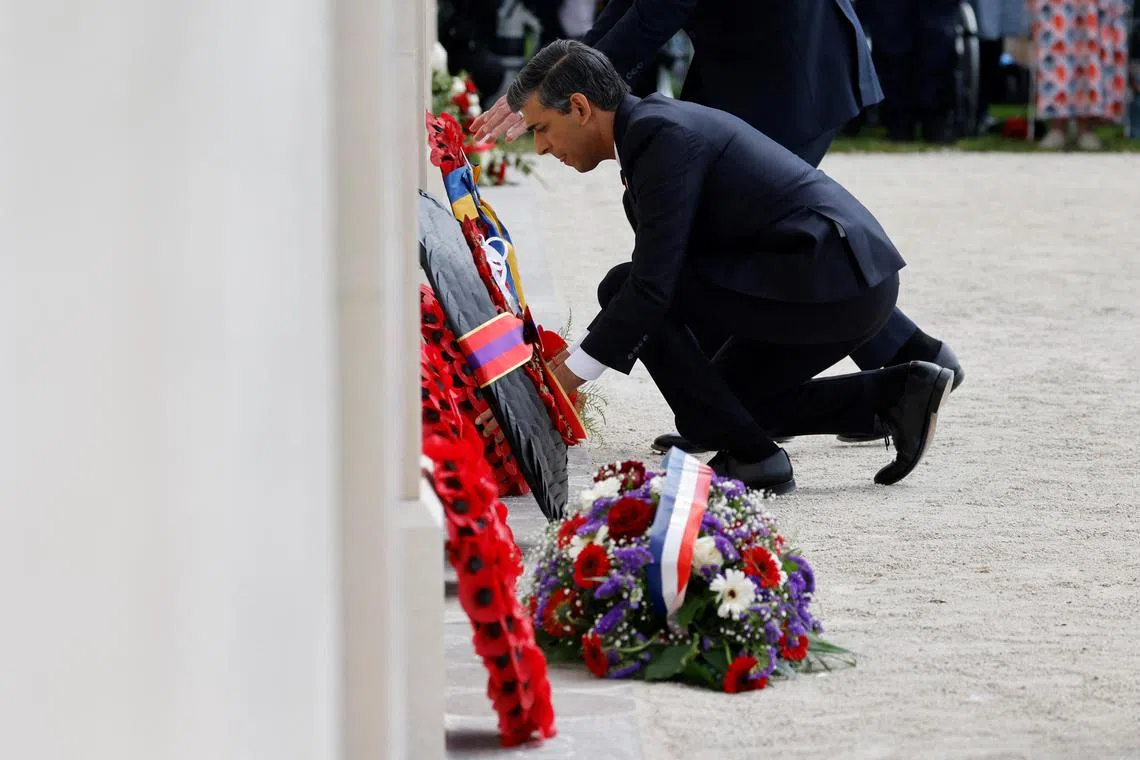British PM Sunak apologises for leaving D-Day events early to campaign
Sign up now: Get ST's newsletters delivered to your inbox

News reports said British PM Rishi Sunak left D-Day commemorations early in order to conduct a television interview.
PHOTO: REUTERS
LONDON – British Prime Minister Rishi Sunak suffered a fresh setback in his struggling election campaign on June 7 when he apologised for leaving D-Day commemorations early in order to give an interview attacking the main opposition party.
Mr Sunak’s decision not to stay at the event in northern France alongside other world leaders on June 6 was met with dismay within his Conservative Party, which is facing the prospect of a huge defeat on July 4, according to opinion polls.
The leader of the opposition Labour Party, Mr Keir Starmer, remained in Normandy for the duration of the D-Day 80th anniversary events and was seen talking to leaders including Ukrainian President Volodymyr Zelensky.
“On reflection, it was a mistake not to stay longer, and I have apologised for that, but I also don’t think it is right to be political in the midst of D-Day commemorations” Mr Sunak told reporters. “The focus should rightly be on the veterans.”
Mr Sunak said his travel plans had been set long before the start of the national election campaign.
World leaders, including United States President Joe Biden and Britain’s King Charles, gathered in Normandy, northern France, to mark the 80th anniversary of the Allied landings,
Mr Sunak spoke at a British-led event, but delegated other duties to ministers, including Foreign Secretary David Cameron, who was pictured with Mr Biden, French President Emmanuel Macron and German Chancellor Olaf Scholz at a memorial ceremony.
Asked for his response to Mr Sunak’s mistake, one normally loyal Conservative politician told Reuters: “I can’t explain it, and I won’t.”
The lawmaker, who asked not to be identified, said Mr Sunak’s decision could end up becoming the “Gillian Duffy moment” of the campaign – a reference to 2010, when then Prime Minister Gordon Brown had to apologise for calling a voter “a bigoted woman”, seen as a turning point in a campaign Mr Brown ultimately lost.
Mr Sunak’s Conservative Party is lagging about 20 points behind the opposition Labour Party in opinion polls.
Mr Sunak’s campaign got off to a shaky start in May when he announced the election date
This week, he suffered another setback when Brexit campaigner Nigel Farage took over leadership of the right-wing Reform UK party and said he would stand in the election.
Mr Sunak has tried to portray himself as the person best placed to look after Britain’s security, and he recently pledged to introduce mandatory national service if he wins the election.
Mr Chris Hopkins, political research director at the polling company Savanta, said Mr Sunak was already seen by voters as out of touch.
The latest “political misjudgment seems almost laser-guided in causing Rishi Sunak and the Conservative Party as much political pain as humanly possible”, he said.
Senior Labour spokesman Jonathan Ashworth accused Mr Sunak of “choosing to prioritise his own vanity TV appearances over our veterans”, and “it is yet more desperation, yet more chaos and yet more dreadful judgment”.
Liberal Democrat leader Ed Davey accused the Prime Minister of a “total dereliction of duty”.
In the interview with ITV on June 6, Mr Sunak doubled down on claims this week that if Labour wins power, it would raise taxes by £2,000 (S$3,444) per household.
Labour denies it has any such plan, and accused Mr Sunak of lying for claiming the estimate came from the civil service, which has said it did not endorse it.
The head of Britain’s statistical watchdog said on June 6 that the Conservatives should be clearer about the source of Mr Sunak’s claims. REUTERS


